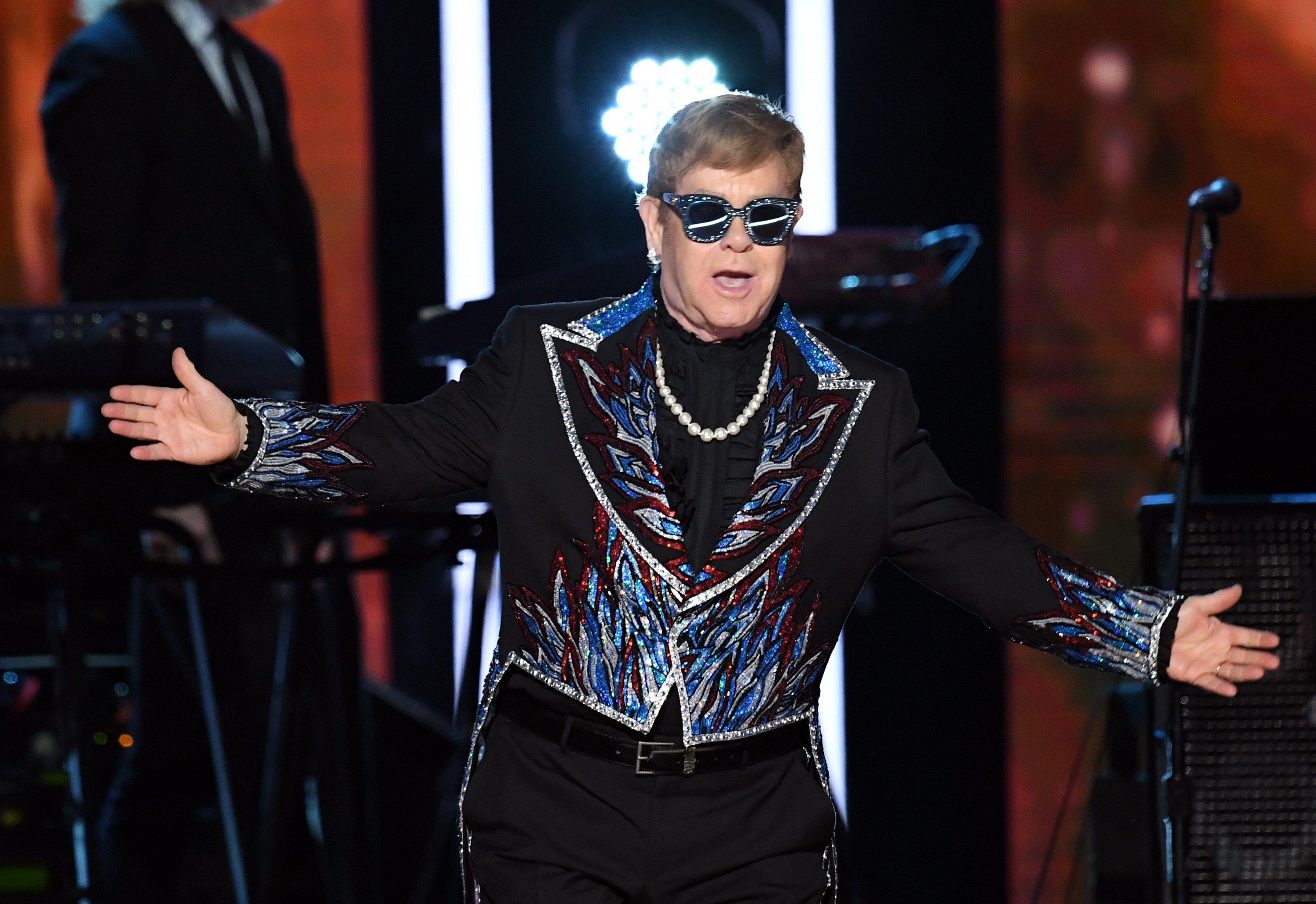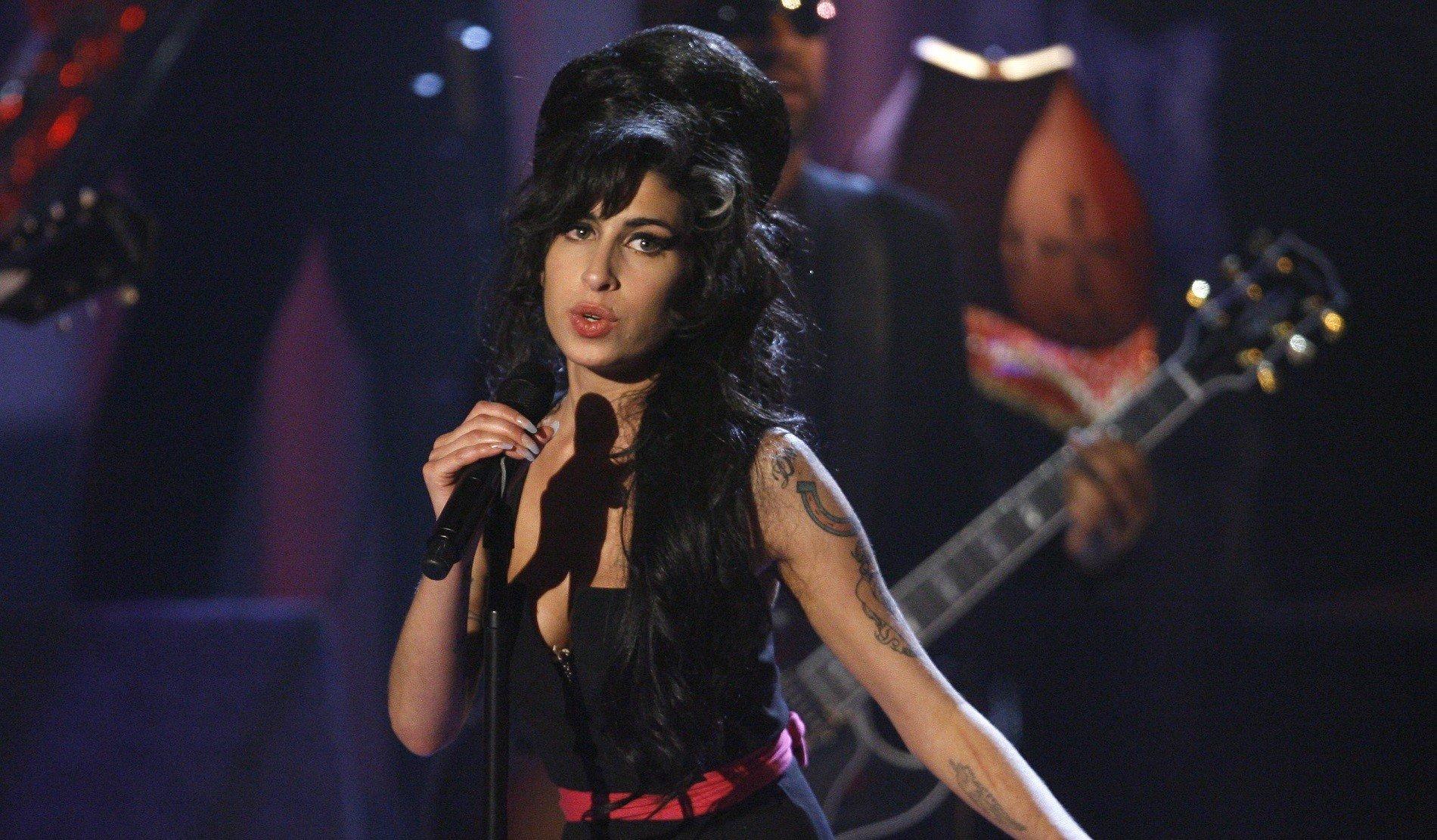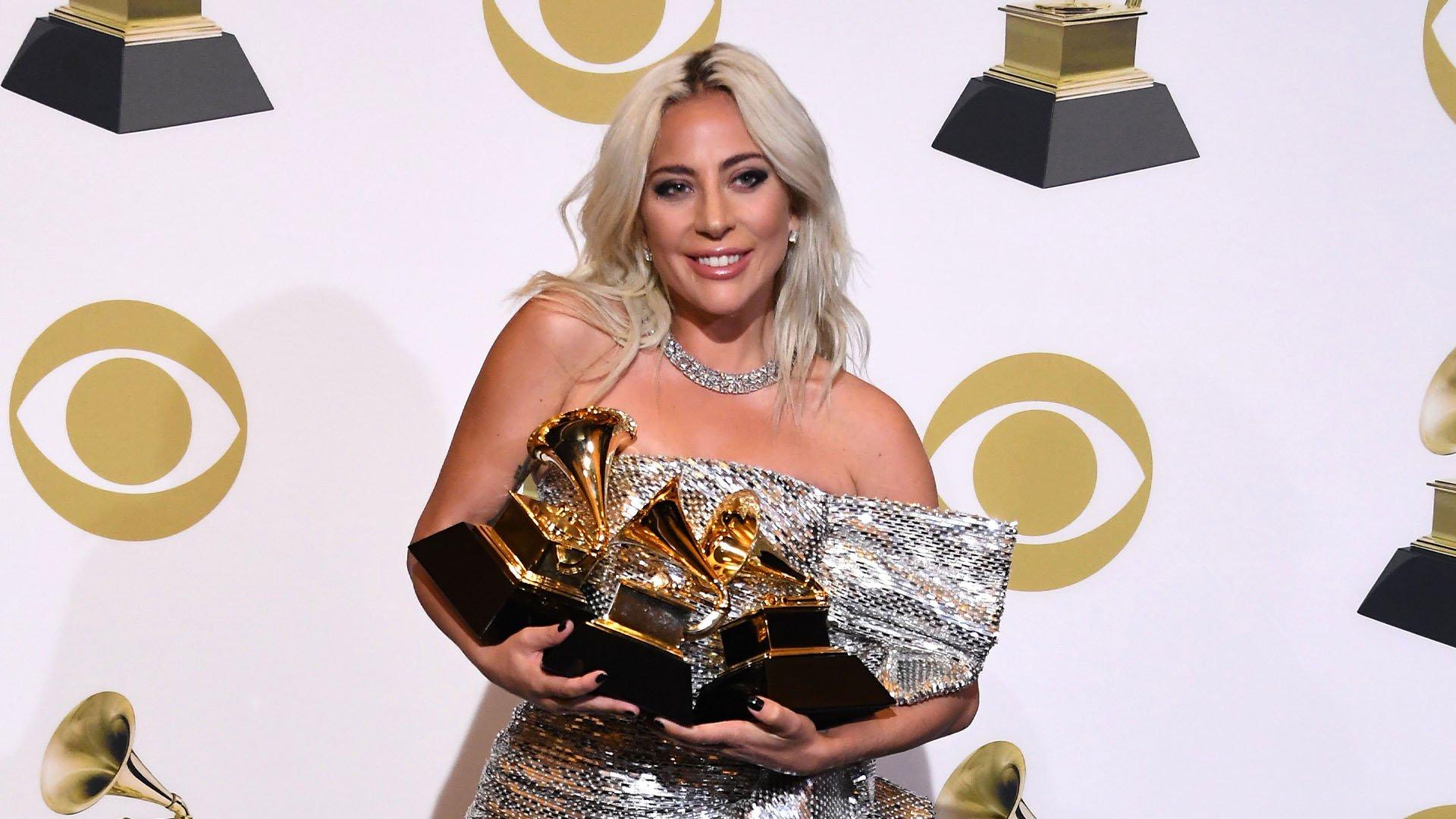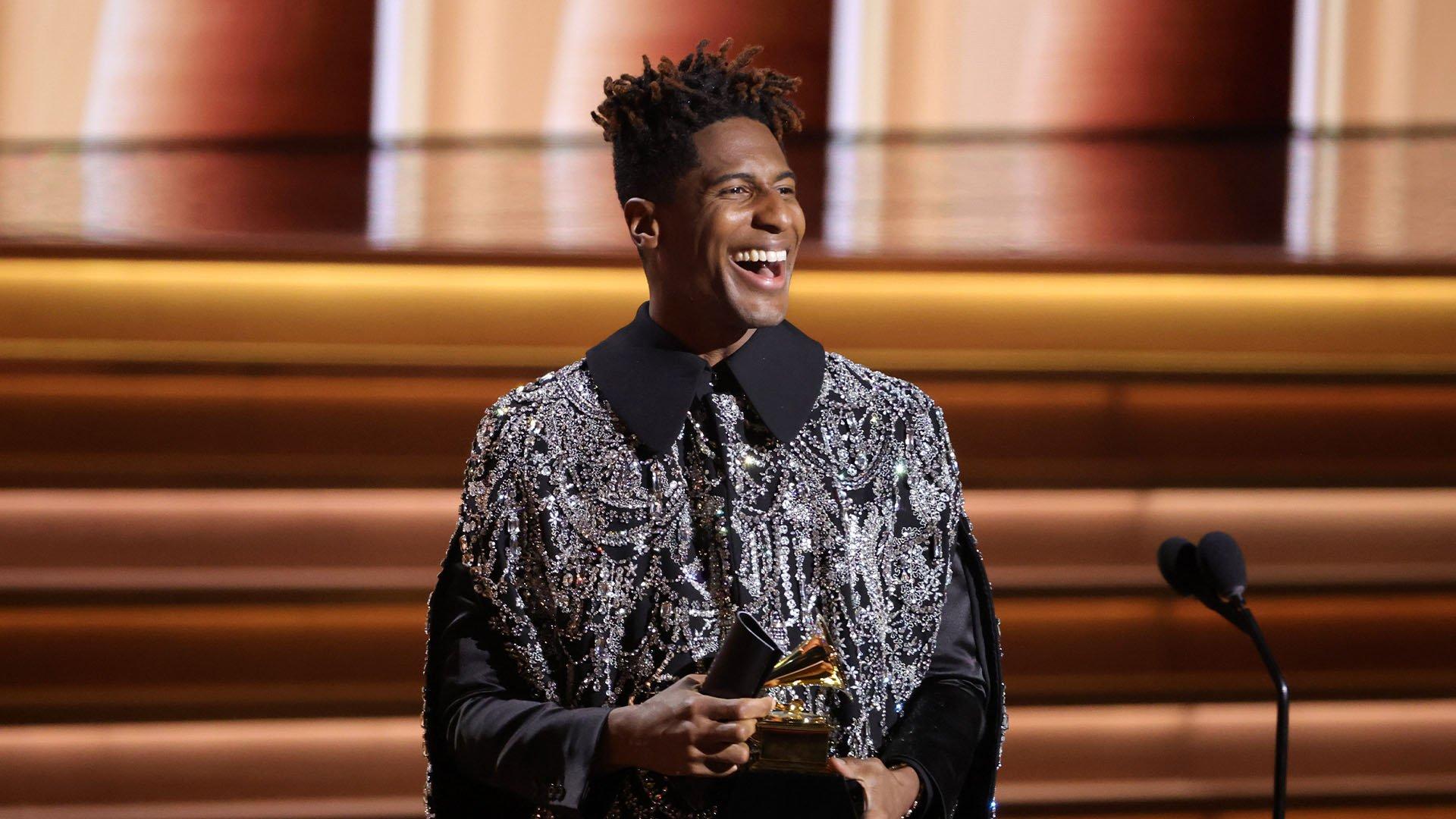Photo: Kevin Winger/Getty Images

Elton John
news
Kesha, Ed Sheeran, SZA & More To Honor Elton John In GRAMMY Salute
Tune in to CBS on April 10 to catch "Elton John: I'm Still Standing — A GRAMMY Salute" featuring an all-star tribute plus special performance of a medley of hits from John himself
How do you celebrate a career as illustrious as that of the great Elton John? With a star-studded concert, of course. "Elton John: I'm Still Standing — A GRAMMY Salute" will air April 10 on CBS and features performances by some of music's biggest names, including Alessia Cara, Miley Cyrus, Kesha, Lady Gaga, Miranda Lambert, John Legend, Little Big Town, Chris Martin, Shawn Mendes, Maren Morris, Ed Sheeran, Sam Smith, and SZA.
Musicians from multiple genres will perform classic songs from John's impressive catalog with longtime co-writer Bernie Taupin. Additionally, there will be special appearances by Jon Batiste, Neil Patrick Harris, Christopher Jackson, Anna Kendrick, Gayle King, Lucy Liu, Valerie Simpson, and Hailee Steinfeld.
The festivities will culminate with a medley of hits performed by John himself, culminating with the event's title song, "I'm Still Standing" from John's 1983 album, Too Low For Zero.
Here is the full list of performances:
"The Bitch Is Back" — Miley Cyrus
"Candle In The Wind" — Ed Sheeran
"Daniel" — Sam Smith
"I Guess That's Why They Call It The Blues" — Alessia Cara
"Your Song" — Lady Gaga
"Rocket Man" — Little Big Town
"Border Song" — Christopher Jackson & Valerie Simpson
"Don't Go Breaking My Heart" — SZA & Shawn Mendes
"Mona Lisas And Mad Hatters" — Maren Morris
"We All Fall In Love Sometimes" — Chris Martin
"My Father's Gun" — Miranda Lambert
"Goodbye Yellow Brick Road" — Kesha
"Don't Let The Sun Go Down On Me" — John Legend
"Bennie And The Jets" — Elton John
"Philadelphia Freedom" — Elton John
"I'm Still Standing" — Elton John & Ensemble
"Elton John: I'm Still Standing–A GRAMMY Salute," continues the tradition of previous Emmy-winning TV specials presented by CBS, the Recording Academy, and AEG Ehrlich Ventures, including "Sinatra 100 — An All-Star GRAMMY Concert," "Stevie Wonder: Songs In The Key Of Life — An All-Star GRAMMY Salute," "The Beatles: The Night That Changed America — A GRAMMY Salute" and "Stayin' Alive: A GRAMMY Salute To The Music Of The Bee Gees."
Tune in April 10 at 9 p.m. ET/PT for this two-hour concert special, only on CBS.

Photo: Chris Polk/FilmMagic
list
How Amy Winehouse's 'Back To Black' Changed Pop Music Forever
Ahead of the new Amy Winehouse biopic 'Back To Black,' reflect on the impact of the album of the same name. Read on for six ways the GRAMMY-winning LP charmed listeners and changed the sound of popular music.
When Amy Winehouse released Back To Black in October 2006, it was a sonic revelation. The beehive-wearing singer’s second full-length blended modern themes with the Shangri-Las sound, crafting something that seemed at once both effortlessly timeless and perfectly timed.
Kicking off with smash single "Rehab" before blasting into swinging bangers like "Me & Mr. Jones," "Love Is A Losing Game," and "You Know I’m No Good," Black To Black has sold over 16 million copies worldwide to date and is the 12th best-selling record of all time in the United Kingdom. It was nominated for six GRAMMY Awards and won five: Record Of The Year, Song Of The Year, Best New Artist, Best Female Pop Vocal Performance, and Best Pop Vocal Album.
Winehouse accepted her golden gramophones via remote link from London due to visa problems. At the time, Winehouse set the record for the most GRAMMYs won by a female British artist in a single year, though that record has since been broken by Adele, who won six in 2011.
Written in the wake of a break-up with on-again, off-again flame Blake Fielder-Civil, Black To Black explores heartbreak, grief, and infidelity, as well as substance abuse, isolation, and various traumas. Following her death in 2011, Back To Black became Winehouse’s most enduring legacy. It remains a revealingly soulful message in a bottle, floating forever on the waves.
With the May 17 release of Sam Taylor-Johnson’s new (and questionably crafted) Winehouse biopic, also titled Back To Black, it's the perfect time to reflect on the album that not only charmed listeners but changed the state of a lot of popular music over the course of just 11 songs. Here are five ways that Back To Black influenced music today.
She Heralded The Arrival Of The Alt Pop Star
When Amy Winehouse hit the stage, people remarked on her big voice. She had classic, old-time torch singer pipes, like Sarah Vaughn or Etta Jones, capable of belting out odes to lost love, unrequited dreams, and crushing breakups. And while those types of singers had been around before Winehouse, they didn’t always get the chance — or grace required — to make their kind of music, with labels and producers often seeking work that was more poppy, hook-packed, or modern.
The success of Back To Black changed that, with artists like Duffy, Adele, and even Lady Gaga drawing more eyes in the wake of Winehouse’s overwhelming success. Both Duffy and Adele released their debut projects in 2007, the year after Back To Black, bringing their big, British sound to the masses. Amy Winehouse's look and sound showed other aspiring singers that they could be different and transgressive without losing appeal.
Before she signed to Interscope in 2007, "nobody knew who I was and I had no fans, no record label," Gaga told Rolling Stone in 2011. "Everybody, when they met me, said I wasn’t pretty enough or that my voice was too low or strange. They had nowhere to put me. And then I saw [Amy Winehouse] in Rolling Stone and I saw her live. I just remember thinking ‘well, they found somewhere to put Amy…’"
If an artist like Winehouse — who was making records and rocking styles that seemed far outside the norm — could break through, then who’s to say someone else as bold or brassy wouldn’t do just as well?
It Encouraged Other Torch Singers In The New Millenium
Back To Black might have sounded fun, with swinging cuts about saying "no" to rehab and being bad news that could seem lighthearted to the casual listener. Dig a little deeper, though, and it’s clear Winehouse is going through some real romantic tumult.
Before Back To Black was released, Fielder-Civil had left Winehouse to get back together with an old girlfriend, and singer felt that she needed to create something good out of all those bad feelings. Songs like "Love Is A Losing Game" and "Tears Dry On Their Own" speak to her fragile emotional state during the making of the record, and to how much she missed Fielder-Civil. The two would later marry, though the couple divorced in 2009.
Today, young pop singers like Olivia Rodrigo, Taylor Swift, and Selena Gomez are lauded for their songs about breakups, boyfriends, and the emotional damage inflicted by callous lovers. While Winehouse certainly wasn’t the first to sing about a broken heart, she was undoubtedly one of the best.
It Created A Bit Of Ronsonmania
Though Mark Ronson was already a fairly successful artist and producer in his own right before he teamed with Winehouse to write and co-produce much of Back To Black, his cred was positively stratospheric after the album's release. Though portions of Back To Black were actually produced by Salaam Remi (who’d previously worked with Winehouse on Frank and who was reportedly working on a follow-up album with her at the time of her death), Ronson got the lion’s share of credit for the record’s sound — perhaps thanks to his his GRAMMY win for Best Pop Vocal Album. Winehouse would even go on to guest on his own Version record, which featured the singer's ever-popular cover of "Valerie."
In the years that followed, Ronson went on to not only produce and make his own funky, genre-bending records, but also to work with acts like Adele, ASAP Rocky, and Paul McCartney, all of whom seemingly wanted a little of the retro soul Ronson could bring. He got huge acclaim for the funk-pop boogie cut "Uptown Funk," which he wrote and released under his own name with help from Bruno Mars, and has pushed into film as well, writing and producing over-the-top tracks like A Star Is Born’s "Shallow" and Barbie’s "I’m Just Ken." To date, he’s been nominated for 17 GRAMMY Awards, winning eight.
Ronson has always acknowledged Winehouse’s role in his success, as well, telling "BBC Breakfast" in 2010, "I've always been really candid about saying that Amy is the reason I am on the map. If it wasn't for the success of Back To Black, no one would have cared too much about Version."
Amy Showcased The Artist As An Individual
When the GRAMMY Museum hosted its "Beyond Black - The Style of Amy Winehouse" exhibit in 2020, Museum Curator and Director of Exhibitions Nicholas Vega called the singer's sartorial influence "undeniable." Whether it was her beehive, her bold eyeliner, or her fitted dresses, artists and fans had adopted elements of Winehouse’s Back To Black style into their own fashion repertoire. And though it’s the look we associate most with Winehouse, it was actually one she had truly developed while making the record, amping up her Frank-era low-slung jeans, tank tops, and polo shirts with darker eyeliner and much bigger hair, as well as flirty dresses, vibrant bras, and heels.
"Her stylist and friends were influential in helping her develop her look, but ultimately Amy took bits and pieces of trends and styles that she admired to create her own look," Vega told GRAMMY.com in 2020. While rock ‘n’ rollers have always leaned into genre-bending styles, Winehouse’s grit is notable in the pop world, where artists typically have a bit more of a sheen. These days, artists like Miley Cyrus, Billie Eillish, and Demi Lovato are willing to let their fans see a bit more of the grit — thanks, no doubt, to the doors Winehouse opened.
Winehouse also opened the door to the beauty salon and the tattoo studio, pushing boundaries with not just her 14 different vintage-inspired tattoos — which have become almost de rigeur these days in entertainment — but also with her signature beehive-like bouffant, which hadn’t really been seen on a popular artist since the ‘60s.It’s a frequent look for contemporary pop divas, popping up on artists like Ariana Grande, Lana Del Rey, and Dua Lipa.
The Dap-Kings Got The Flowers They Deserved
Six of Back To Black’s 11 songs, including "Rehab," got their "retro" sound via backing from the Dap-Kings, a Brooklyn-based soul act Ronson recruited for the project.
While Winehouse’s lyrics were mostly laid down in London, the Dap-Kings did their parts in New York. Ronson told GRAMMY.com in 2023 that the Dap-Kings "brought ['Rehab'] to life," saying, "I felt like I was floating because I couldn’t believe anybody could still make that drum sound in 2006." Winehouse and the Dap-Kings met months later after the record was released, and recorded "Valerie." The band later backed Winehouse on her U.S. tour.
Though the Dap-Kings were known in hip musical circles for their work with late-to-success soul sensation Sharon Jones, Back To Black’s immense success buoyed the listening public’s interest in soul music and the Dap-Kings' own profile (not to mention that of their label, Daptone Records).
"Soul music never went away and soul lovers never went away, but they’re just kind of closeted because they didn’t think it was commercially viable," Dap-Kings guitarist Binky Griptite said in the book It Ain't Retro: Daptone Records & The 21st Century Soul Revolution. "Then, when Amy’s record hit, all the undercover soul fans are like, I’m free. And then that’s when everybody’s like, Oh, there’s money in it now."
The success of Back To Black also seems to have firmly cemented the Dap-Kings in Ronson’s Rolodex, with the group’s drummer Homer Steinweiss, multi-instrumentalist Leon Michaels, trumpeter Dave Guy, and guitarist/producer Tom Brenneck appearing on many of his projects; the Dap-Kings' horns got prominent placement in "Uptown Funk."
Amy Exposed The Darker Side Of Overwhelming Success
Four years after Winehouse died, a documentary about her life was released. Asif Kapadia’s Amy became an instant rock-doc classic, detailing not only Winehouse’s upbringing, but also her struggles with fame and addiction. It won 30 awards after release, including Best Documentary Feature at the 88th Academy Awards and Best Music Film at the 58th GRAMMY Awards.
It also made a lot of people angry — not for how it portrayed Winehouse, but for how she was made to feel, whether by the British press or by people she considered close. The film documented Winehouse’s struggles with bulimia, self-harm, and depression, and left fans and artists alike feeling heartbroken all over again about the singer’s passing.
The documentary also let fans in on what life was really like for Winehouse, and potentially for other artists in the public eye. British rapper Stormzy summed it up well in 2016 when he told i-D, "I saw the [documentary, Amy] – it got me flipping angry... [Amy’s story] struck a chord with me in the sense that, as a creative, it looks like on the outside, that it’s very ‘go studio, make a hit, go and perform it around the world, champagne in the club, loads of girls’. But the graft and the emotional strain of being a musician is very hard. No one ever sees that part."
These days, perhaps because of Winehouse’s plight or documentaries like Amy, the music-loving population seems far more inclined to give their favorite singers a little grace, whether it’s advocating for the end of Britney Spears’ conservatorship or sympathizing with Demi Lovato’s personal struggles. Even the biggest pop stars are still people, and Amy really drove that point home.
We Only Said Goodbye With Words: Remembering Amy Winehouse 10 Years Later

Photo: Steve Granitz/WireImage/Getty Images
video
GRAMMY Rewind: Watch Lady Gaga Advocate For Mental Health Awareness During Her 2019 Win For "Shallow"
Lady Gaga accepts the Best Pop/Duo Group Performance award for "Shallow" from 'A Star Is Born' at the 2019 GRAMMYs while encouraging the audience "to take care of each other."
Between two award seasons, A Star Is Born received seven nominations — including Record Of The Year and two nods for Song Of The Year — and four wins for Best Compilation Soundtrack for Visual Media, Best Song Written for Visual Media twice, and Best Pop/Duo Group Performance.
In this episode of GRAMMY Rewind, travel to 2019 to watch Lady Gaga accept one of the album's first GRAMMY wins for Best Pop/Duo Group Performance for "Shallow."
After thanking God and her family for their unwavering support, Lady Gaga expressed gratitude for her co-star, Bradley Cooper. "I wish Bradley was here with me right now," Gaga praised. "I know he wants to be here. Bradley, I loved singing this song with you."
Gaga went on to express how proud she was to be a part of a movie that addresses mental health. "A lot of artists deal with that. We've got to take care of each other. So, if you see somebody that's hurting, don't look away. And if you're hurting, even though it might be hard, try to find that bravery within yourself to dive deep, tell somebody, and take them up in your head with you."
Press play on the video above to hear Lady Gaga's complete acceptance speech for A Star Is Born's "Shallow" at the 2019 GRAMMY Awards, and check back to GRAMMY.com for more new episodes of GRAMMY Rewind.
Run The World: How Lady Gaga Changed The Music Industry With Dance-Pop & Unapologetic Feminism

Photo: Matt Winkelmeyer/Getty Images
video
GRAMMY Rewind: Watch Jon Batiste’s Encouraging Speech For His 2022 Album Of The Year Win For 'We Are'
Jon Batiste accepts the Album Of The Year award for We Are, a win that he dedicated to "real artists, real musicians."
Jon Batiste walked into the 2022 GRAMMYs with a whopping 11 nominations, making him the most recognized artist of the evening. By the end of the night, he received five GRAMMYs for Best American Roots Performance, Best American Roots Song, Best Score Soundtrack For Visual Media, Best Music Video, and the highly coveted Album Of The Year.
In this episode of GRAMMY Rewind, watch Batiste take the stage to accept the award for Album Of The Year for his sixth studio album, We Are
Batiste began his praises by acknowledging God: "I just put my head down and work on the craft every day. I love music, he said. "I've been playing since I was a little boy. It's more than entertainment for me — it's a spiritual practice." He also thanked the "many people that went into making this album," including his grandfather, nephew, father, and executive producer, Ryan Lynn.
"This [award] is for real artists, real musicians. Let's just keep going. Be you! That's it. I love you even if I don't know you," Batiste cheered.
Press play on the video above to hear Jon Batiste's complete acceptance speech and check back to GRAMMY.com for more new episodes of GRAMMY Rewind.

Photo: Mauricio Santana/Getty Images
list
Enter Anitta's Brazilian 'Funk Generation': 5 Takeaways From Her New Album
Anitta brand-new album 'Funk Generation' is the culmination of a long-held dream to bring Brazilian funk to the world. Read on for five ways Anitta's genre-bending album showcases an "energy that's very unique to Brazil."
After establishing herself as a global pop star, Brazilian singer Anitta is bringing the music of her country to the forefront. On the just-released Funk Generation, the Latin GRAMMY nominee puts a spotlight on funk carioca — Brazilian funk.
On the 15-track album, Anitta sings in Portuguese, Spanish, and English over funk carioca beats, which are Brazil’s aggressive and hyper spin on genres like hip-hop and Miami bass. As with her previous releases, Funk Generation has elements of EDM, reggaeton, and pop, but the rhythms also known as baile funk are the star. The album represents a new era for Anitta, which she first kicked off in June with "Funk Rave," a single and video that captures the spirit of Brazil's favelas where funk carioca was born.
Anitta later introduced Brazil's melodic funk subgenre to her global audience with the dreamy "Mil Veces." Now Anitta is expanding her funky world by bringing artists like Sam Smith, Brray, and Bad Gyal into her funky world.
"I'm going to accomplish making a lot of artists and people like funk," Anitta tells GRAMMY.com, adding that she hopes listeners "start embracing this rhythm that's very good, that invites you to dance, and that has an energy that's very unique to Brazil."
Funk Generation follows Anitta's rise to international stardom. Following a decade of making her mark in Brazil and later Latin America, Anitta went fully international with her 2022 album Versions of Me and the viral hit "Envolver." The album helped Anitta garner a GRAMMY nomination for Best New Artist in 2023 and a Latin GRAMMY nomination for Record Of The Year. She later told GRAMMY.com that "dreamed" of putting out a Brazilian funk album.
Anitta has made that dream come true with Funk Generation. Here are five takeaways from her genre-bending album, including insight from the Brazilian superstar herself.
Anitta Said Making A Funk Carioca Album Was A "Challenge"
In March 2023, Anitta revealed that she was trying to get out of her contract with Warner Music, alleging a lack of support from the label. After parting ways with Warner in April, she signed a new deal with Republic Records and Universal Latin shortly after. It seems that her new label home offered the support she was looking for: She released "Funk Rave" in June 2023.
"This funk album has been a challenge for me because it's not a rhythm that people are doing out there," she says. "It's something that’s very new that I'm going to introduce to people so they like it, listen to it, and try to do it as well."
She Wants to Continue To Breaking The Divide Between Latin America & Brazil
While Brazil is a part of Latin America, there still exists a bit of a cultural divide with Spanish-speaking Latin American countries because of language differences. On Funk Generation, Anitta aims to bridge that gap by featuring Latin music acts who embrace her Brazilian funk vibes.
On the sultry "Double Team," she is joined by Puerto Rican singer and rapper Brray and Barcelona-based artist Bad Gyal, who performed with Anitta for the first time at awards ceremony Premio Lo Nuestro in February. They get into the groove in Spanish with no problem alongside Anitta.
"It's been many years since Brazil has gotten to this international level, that a lot of people are listening to Brazilian songs, and I know I've worked a lot for this to happen," Anitta says. "More Latin artists coming to Brazil, who are curious and interested in making a career there.
"It's been very important for me to create this cultural exchange because the Latino countries and Brazil are side-by-side, but it's like there's a big barrier between them because of language," she continues. "With music, we can break through."
Sam Smith Embraces Funk Carioca For The First Time
It’s not only Latin music acts who are getting in on funk carioca with Anitta. British superstar Sam Smith joins Anitta for the freaky "Ahi," and Smith's soulful voice soars over the sleek Brazilian funk rhythms. The collaboration shows how determined Anitta is to push the music of her country into the mainstream with Smith being one of most prominent pop artists from the UK to embrace the genre.
The song also marks an important moment for LGBTQIA+ representation with Anitta, who is bisexual, teaming up with the non-binary GRAMMY winner.
Funk Generation Spotlights Brazilian Talent
Anitta shares her platform with more Brazilian acts in the alluring "Joga Pra Lua," an EDM-infused funk banger that invites the listener to a block party where they get lost in the music.
Translated to "play for the moon," the track is produced by fellow Brazilian DENNIS (who recently scored a global hit with the remix of "Tá OK" featuring Kevin o Chris, Karol G, and Maluma). Anitta is also joined on the track by Brazilian hitmaker Pedro Sampaio, who sings in Portuguese.
Anitta Is Looking Toward The Future Of Funk Carioca
Despite the few features, Funk Generation is an album where Anitta largely shines solo. She not only puts a spotlight on the Brazilian genre with this LP, but pushes it to new places. One of the standouts is the frenetic "Grip" where Anitta blends Brazilian funk with elements of Miami bass music that’s reminiscent of the ‘90s. She sings in Portuguese, English and Spanish throughout the song.
Whereas funk carioca played second fiddle to many other genres in her previous album, now the tables are turned in Funk Generation. She seamlessly blends pop with funk carioca in the fully English track "Love in Common" that could sneak those rhythms onto Top 40 radio. Anitta also finds a common thread between Brazilian funk, reggaeton, and Afrobeat in the multicultural banger "Aceita."
The future of baile funk looks bright in Anitta’s hands.
